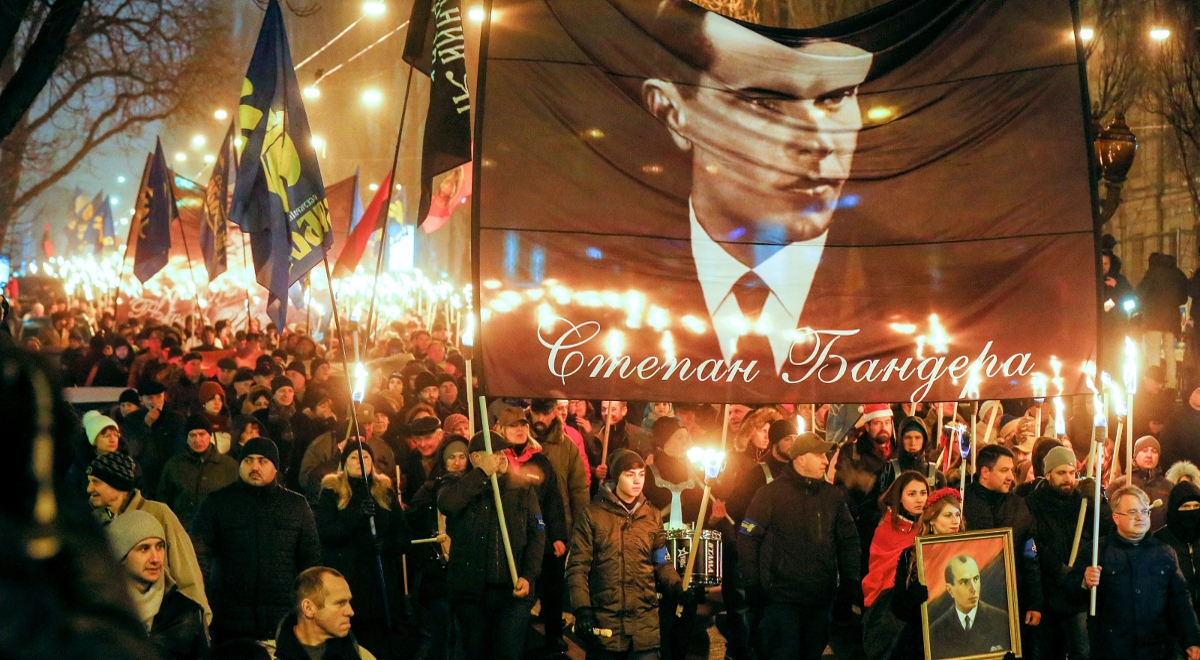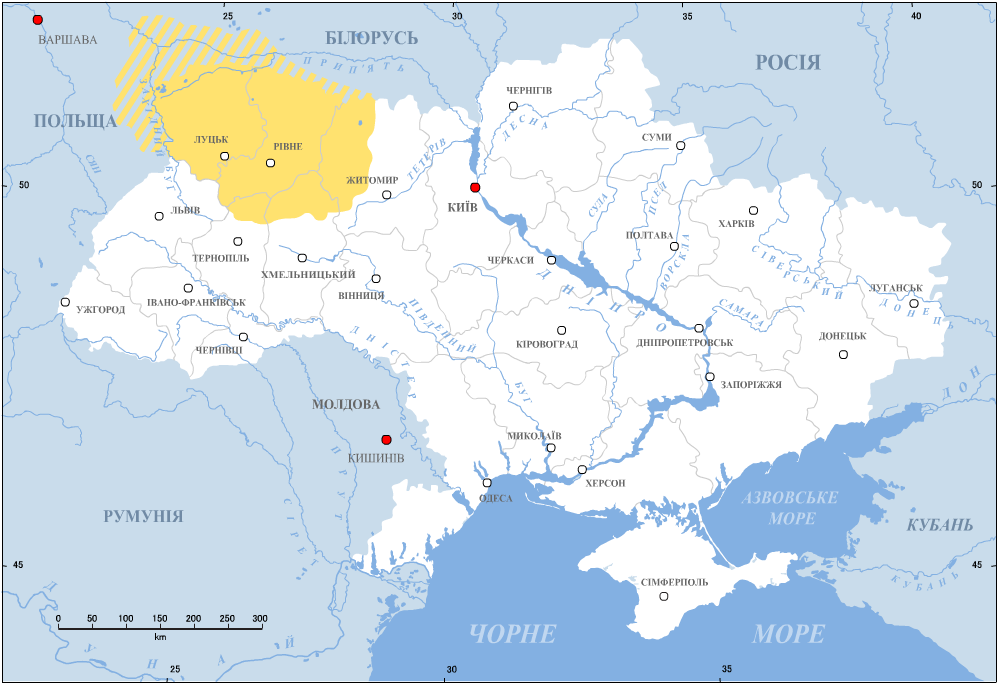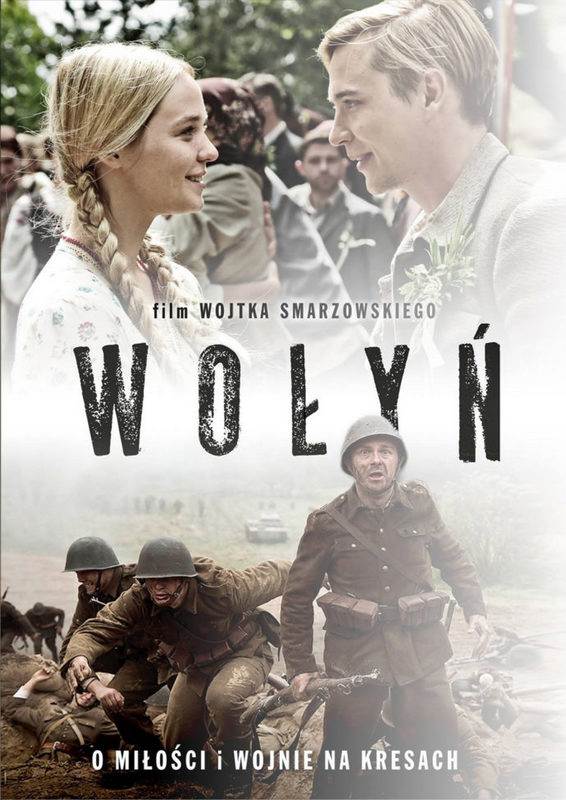Ukraine untold: Is it time for America to ignore Ukraine’s unsolved past, and sacrifice its core values and national interest on the alter of the post-Cold War blindness?
In
Log in if you are already registered
As we have just welcomed the year 2017, many geostrategic agencies and foreign policy pundits have already started sharing with us their political risk bets for the coming months.
In almost every of these predictions Russia, and inherently related to her case of Ukraine, is to be found at the top of the list.
Obviously, this would not mean anything extraordinary, and could be perceived as a regular New Year’s update of the already appointed foreign policy path, if not for the fact that it is Donald J. Trump who was sworn in as the 45th president of the United States of America on January 20, 2017, not Hillary Clinton. The man, who many times during his campaign suggested that wants to improve the recent tragic relations with Moscow.

75 anniversary of the UPA, 1 January 2017, Kiev, source: polskieradio.pl
On that note, it is understandable that many of the hard Cold War warriors and their mainstream media allies affiliated to neoconservative wing of the Republican Party would try their best to persuade the new commander in chief that seeking the new path of engagement with Russia, even though the current one haven’t brought any good results so far, isn’t a good idea - somehow neglecting the fact how rapidly the modern world is changing, confronting us with entirely new challenges.
Being driven by the principle, which says that “better the devil you know than the devil you don’t know,” they will not like to abandon their post-Cold War comfort zone, which last nearly 27 years, and as the main argument they will use Ukraine to justify their position.
Since the conflict in this Eastern European country, and hotly debated case of the Crimea annexation (or as some Russians, including Mikhail Gorbachev who was born into a mixed Russian-Ukrainian family, may refer to “the reunification”), started, all the American consumer of the mainstream media (the very same media, which didn’t predict President Trump win, and still can’t face up this truth) know about this, as Neville Chamberlain would have called it, ‘faraway country’ is, in short, that in February 2014 people of Ukraine decided to take the matters into their own hands and opposed former President Victor Yanukovych’s vision for the country to strengthen its economic ties with Russia instead of the European Union.

Volhynia (yellow) in Ukraine, source: wikipedia.org
In retaliation, as the generally accepted narratives says, President Vladimir Putin orchestrated military intervention in Eastern part of Ukraine to spark unrest, and ultimately stole Crimea in order to prevent the country’s stability, prosperity, and its peoples’ hope for freedom and democratic future.
Despite the fact that the majority of Crimean people are happy with their choice, as Kenneth Rapoza proves on the ground of two Western-based studies in his article in Forbes titled One Year After Russia Annexed Crimea, Locals Prefer Moscow To Kiev, and Ukraine is being “at risk of becoming a failed state” without recognising “that economic survival depends on Moscow not the west,” as Professor Nicolai N. Petro explains in his article for The Guardian titled Why Ukraine needs Russia more than ever, some of the Washington hawkish Don Quixotes (including Republican Senator John McCain) fervently believe that the best way to move forward about Russia is to antagonize her further. They are being so much blinded by their desire to “break the back of the Russian government” that they don’t even have time to even considering Henry Kissinger’s vision for Ukraine, where he suggests that “we should explore the possibilities of a status of nonmilitary grouping on the territory between Russia and the existing frontiers of NATO,” in order to bring the dangerously deteriorated relationship between both countries on the right track.

Bearing all this in mind, by coming from the country directly neighbouring with Ukraine (which made me to pay close attention to the ongoing debate, and successfully allowed me to share my first hand insights on the very matter with the Western audience by complementing sometimes incomplete reporting on this very important issue for the future of my country and the CEE region security), I have a legitimate fear that President Trump’s vision could be doomed by “an ahistorical people... [who are not thought] history anymore as a sequence of events… but deal with it in terms of themes without context,” as Kissinger rightly noticed.
Having said that, wholeheartedly believing that in order to pursue realistic foreign policy first and foremost we should try to grasp the whole picture (even if certain facts may feel inconvenient), I do believe that hearing the local voices and their perspective may contribute to the coming debate, and equip President Trump’s advisers with an important knowledge needed to make the right move, which would truly have the America’s national interest at its core.
Poland, which is historically known to be one of the most loyal allies of the United States, is the country, which is directly exposed to the outcomes of what happened in February 2014 in Ukraine, as well as poses a significant historical and political knowledge and experience related to Ukraine, as well as Russia.
Though during the post-Maiden fever many have thought that history doesn’t play as significant role as it was in times before liberal utopianism suppressed realism in the foreign policy thinking, the history of Polish-Ukrainian difficult (and more live than ever) relations should be considered as an important factor, which should be taken into the account when it comes to forming further policies towards, for example, arming Ukraine – knowing now that even Mr Rex Tillerson seems to be quite supportive towards this idea.
As not many people in America may know, a famous Polish screenwriter and director, who is “considered one of the most severe societal commentators since the political transformation in 1989,” Wojciech Smarzowski hit upon an idea in 2013 to finally raise a topic of the tragic events in Volhynia (1943-1944), which have been silenced so far in the native cinema and public debate.
Smarzowski started developing the screenplay to his movie by being inspired by the collection of short stories titled Nienawiść (eng. “Hate”), whose author is Stanisław Srokowski.
The director decided that the background of the events will be set in a small village in Volhynia, which was inhabited by the Poles, Jews and Ukrainians, and it will cover a period of 6 years – starting in the spring of 1939, and ending in the summer of 1945. This includes the very outbreak of World War II, life under the Soviet occupation in the village, then the Nazi Germany attack on the USSR, the campaign against the Polish Jews, the murder of Jewish families – and above all Ukrainian ambitions to create an independent state.
Smarzowski didn’t want to take a shortcut in presenting brutality of the tensions between Poles and Ukrainians, but he separates ordinary Ukrainians from supporters of Stepan Bandera. He also didn’t hesitate to show the disgraceful actions committed in retaliation by Poles on Ukrainians.
Interview with the authors of the movie (with English subtitles), source: YouTube
It is in the given village, where the main character of the movie named Zosia Głowacka lives, when during summer of 1943 the tragedy reaches its climax, and as same as in the surrounding villages UPA (eng. The Ukrainian Insurgent Army) spreads its bloody rampage. Though Zosia and her children are ultimately being saved by Ukrainians, she is not willing to stay in the village and like many others is fleeing to the western part of Poland in search of stability and peace. However, her journey is another chapter of misfortunes. The girl sees slaughter and massacre in the areas through which she travels. In the summer of 1945, like other exiled Poles and Jews, she decides to leave the Eastern Borderlands and escapes the nightmare in the cattle car.
According to historians, in the years 1943-1945 in Volhynia and Eastern Galicia around 100 000 Poles and Jews were killed by the Ukrainian Insurgent Army troops and the local Ukrainian population. Most of these crimes were committed with axes, pitchforks and saws.
In retaliation, Poles killed approx. 10 000-12 000 Ukrainians (including 3 000-5 000 people in Volhynia and Eastern Galicia).
What is also worth mentioning is the fact that Ukrainian nationalists were exceptionally brutal towards mixed Polish-Ukrainian families and Ukrainians, who refused to participate in the massacre aimed at Poles, and those who were saving them.
The Book of the Righteous of the Eastern Borderlands 1939-1943 published by the Polish Institute of National Remembrance (IPN), which was prepared by Romuald Niedzielko, says that Ukrainians rescued 2 527 Poles, where for this help 384 Ukrainians paid with their lives.
It is due to this very controversial topic why Smarzowski’s idea met with serious financial setbacks, forcing him to issue a very emotional appeal, uploaded on Youtube channel on February 09, 2016, aimed at general public to help him raise the missing 2,5 mln zl (around $600000) to finish his movie.
“Companies and banks, which usually support budgets of Polish movies, immediately withdraw when you present them with slogans of “genocide,” “massacre,” “Bandera,” or “Ukraine.” The topic of the movie stings and therefore we are looking for money everywhere. Every penny is precious, and that’s why I’m asking for financial support,” said the director.
To increase the chances to succeed, Smarzowski created foundation which aim was to collecting money needed to finishing the movie.
Nonetheless, as it was expected, money wasn’t the only obstacle to Smarzoski’s plans, as slander and mockery, like on the example of Andriy Lyubka, appeared to be as acute as shortages of funds.
“When I heard that such film is being prepared and who is it director, the first idea was to find out who finances the production: Gazprom or Janusz Korwin-Mikke personally? Because today it only suits Russia,” ironically said the Ukrainian writer in an article published by Newsweek Poland.
“After this movie the Polish-Ukrainian relations will set back in about 10 years… The movie may be brilliant, but now the theme of Volhynia will not do anything good. It will rather convince young Poles that they must never be friends with their Ukrainian peers, instead of encouraging them to co-operate together - whether it comes to support of Maidan or joint cleaning of graves. Smarzowski pockets old ax among new generation that began to be interested with each other,” hysterically concluded Lyubka.
The movie producer, Dariusz Pietrykowski, dared to have a different opinion than voices similar to those of Lyubka’s.
“Is this a good time for such a movie? This is a very difficult question. I immediately ask other: is anyone able to say when it will be the right time? This topic was not raised in any film for nearly 73 years now, as there was always an inadequate time to do this,” said Pietrykowski.
On the other hand, the director himself also decided to respond to the unfavourable notion voiced in the public debate.
“What does it mean “now”? It was never a good time to shoot this movie – neither during communism, nor after 1989. Now the Maidan revolution occurred, and we do not know what will be the situation in Ukraine when we finish our work,” Smarzowski intimated.
“It will not be an easy movie, but it is necessary especially now, when the reconciliation between Poles and Ukrainians is so lively discussed. You can’t conceal the truth about the crime, because it can only generates additional crimes… If our relations meant to be good, they will be good. However, creating a situation of love by force, when we omit topic of the Eastern Borderlands people and we are not talking about the murdered Poles, shows us in a very poor light as a nation,” the director concluded.
Janina Kalinowska, who as a child was the only survivor of the Ukrainian massacre in her village and today chairs the Association of Commemoration the Murdered Poles in Volhynia (pol. “Stowarzyszenie Upamiętniania Polaków Pomordowanych na Wołyniu”) was also echoing Smarzowski’s rhetoric by asking “why the Volhynia case is not as openly discussed as the Katyn massacre or the Warsaw Uprising?”
Nonetheless, not every one seemed to welcome the director’s attempt to open honest debate about the inconvenient truth, as well as general discussion which took place last year at the Polish governmental level on the massacre conducted by OUN-UPA on Poles.
In early June 2016, Ukrainian heads of Churches, former Presidents of Ukraine Victor Yushchenko, and well-known state and public figures and intellectuals published a letter titled Open appeal to the authorities of the Polish state, spiritual and cultural leaders and to the entire Polish society, where we can read the following thing:
“The greatest evil of our relations was the inequality that came from Ukraine’s statelessness. With fatal consistency, the disaster of Ukrainian statehood led to the ruination of the Polish state.”
Yet the most significant, and important for the fair analysis of the phenomenon of Ukrainian fight for independence and full comprehension of its roots and motives, is this part.
“Polish opinion has yet to fully accept the uniqueness of the Ukrainian national tradition as a justified struggle for statehood and independence, which deserves respect.”
At this point, it is worth to mention that Yushchenko, who is one of the co-signers of the open letter, is the one who on January 22, 2010 awarded the title of the Hero of Ukraine to the leader of nationalistic OUN party Stepan Bandera for, as he said, “defending national idea and for the fight for independent Ukrainian state” (the move condemned, among many others, by the largest Jewish human rights organization in the US, the Simon Wiesenthal Center), and only few days after, on the 29th of January, he issued a decree acknowledging OUN-UPA (Organization of Ukrainian Nationalists - Ukrainian Insurgent Army) as legitimate participants of the fight for the country’s independence.
The very motion, however, received a legal status on April 9, 2015 when was accepted by Ukraine’s parliament called the Verkhovna Rada, and just after when President Petro Poroshenko signed the package of four bills on “decomunization,” where one of the documents is titled On the Legal Status and Honouring of Fighters for Ukraine’s Independence in the Twentieth Century, which covers a long list of individuals and organisations from human rights activists to guerrillas accused of ethnic cleansing. It allows veterans of the Organisation of Ukrainian Nationalists (OUN) and the Ukrainian Insurgent Army (UPA), followers of Bandera, to receive state benefits, and rules that denial or disrespect of their role in fighting for Ukrainian independence is an unlawful “desecration of their memory.”
Having said that, no wonder the very document sparked concerns among American Jews, and was condemned by Father Tadeusz Isakowicz-Zaleski, who is a Polish Roman Catholic and Armenian Catholic priest, author and an activist of the anticommunist student opposition in Kraków in the late 1970s, who later became a Solidarity chaplain in Kraków’s Nowa Huta district, for applying punishment to foreigners in Ukraine, including Polish citizens, who will say or write that Bandera and UPA were killing Poles, Jews and Armenians in the territory of the Eastern Borderlands (pol. Kresy).
Going back to the earlier mentioned appeal dated June 2, 2016, it is astonishing that only 12 days latter (on the 14th of June) Mrs Ivanna Klympush-Tsintsadze (a vice-prime minister on European integration in the Groysman government) hurried to give a highly controversial interview at one of the most respectable newspapers in Poland Rzeczpospolita titled Roman Shukhevych is a hero of Ukraine, where she is praising a murderer and military leader and general of the Ukrainian Insurgent Army (UPA) to the skies – sparking a legitimate concerns about Ukrainian political elites and their ongoing obsessive homage the legend and ideologies of Stepan Bandera.
Mrs Klympush-Tsintsadze denies there the historical facts concerning the genocidal activities of OUN-UPA by suggesting that “historians must now examine whether Shukhevych was actually responsible for these terrible things, or maybe someone else was putting on UPA uniforms and killing in the name of UPA.”
I would call it a deliberate lie, as personal responsibility of Bandera and Shukhevych for the actions of UPA have been ascertained not only by “Soviet historians,” as the lady suggests, but also German and American ones, where the following excerpt from Timothy Snyder’s book titled The Reconstruction of Nations: Poland, Ukraine, Lithuania, Belarus, 1569–1999 (p. 162) resolves any doubts regarding the very matter:
“Ukrainian partisans who mass-murdered Poles in 1943 followed the tactics they learned as collaborators in the Holocaust in 1942: detailed advance planning and site selection; persuasive assurances to local populations prior to actions; sudden encirclements of settlements; and then physical elimination of human beings. Ukrainians learned the techniques of mass murder from Germans. This is why UPA ethnic cleansing was striking in its efficiency, and why Volhynian Poles in 1943 were nearly as helpless as Volhynian Jews in 1942. It is one reason why the campaign against Poles began in Volhynia rather than Galicia, since in Volhynia the Ukrainian police played a greater role in the Final Solution. This links the Holocaust of the Jews and the slaughter of the Poles, since it explains the presence of thousands of Ukrainians in Volhynia with experience in genocide.”
Fortunately, despite all of this pressure from Ukrainian side, the Sejm in Poland declared in July 2016 the World War II-era killings committed by Ukrainian nationalists against Polish civilians as “genocide,” referring to the massacres of Poles in Volhynia and Eastern Galicia, and the next month Wojciech Smarzowski’s important movie commemorating this tragedy entered cinemas in the country – though it was successfully prevented from screening in Ukraine by Ukraine’s foreign ministry, and those of Ukrainian actors who took part in the movie were punished.
Sadly, still many advocates of the Ukrainian cause around the world don’t back down and try to silence the truth by accusing those who stand up for the memory of victims of the Ukrainian genocide of being a “Putin’s useful idiots” who consciously support Kremlin’s rhetoric, forcing such prominent members of Polish Parliament, who are respected anticommunist role models, like Mr Kornel Morawiecki (the founder and leader of Fighting Solidarity (pol. “Solidarność Walcząca”) to the following statements made on October 20, 2016: “I prefer to be on the side of useful idiots than the hypocrites and liars… You can not build values, good values among nations, between states, on falsehood, because nothing will be built on this.”
Following Mr Morawiecki’s logic, not many people believe anymore in statements like those made by Polish Ambassador to Ukraine Jan Piekło, who tries very hard to whitewash the truth about such unacceptable slogans like “Glory to Ukraine!”, and being as offensive as “Heil Hitler” Nazi salute:
“The most important thing, in my opinion, is the fact that the “Glory to Ukraine,” which was the slogan of Bandera followers, became not its symbolic, but the meaning of “Euromaidan,” a new Ukraine. This process continues and there is no problem in the fact that Polish society will protest against the Tryzub [having nearly the same connotation as the Swastika] or the monument of Stepan Bandera. All this takes on a different perspective, the symbolic meaning, which symbolise the new Ukraine, which wants a democratic development and to be in Europe. Ukraine needs the European Union and the United States support.”
Of course, and I would be damned if I allow myself to think the opposite, Ukraine deserves our help and support, but the question is whether at the expense of truth or passing over unpleasant facts.
Given the fact that the EU have difficulties in finding how its money was spent in Ukraine so far, as well as raise of the Ukrainian far-right incidents of anti-Semitic and Nazi background in Poland, which are linked to the Azov Battalion (the military fascist group, which effectively formed in October 2016 a political party), I honestly believe that it would be worth considering by President Donald Trump the Carnegie Endowment for International Peace’s memo titled Ukraine Reform Monitor: August 2015 before making a final decision on possibility of arming the country, where authors report the following thing:
‘The armed confrontation in the town of Mukachevo in July 2015 between a private security group working for a Rada deputy and members of the nationalist Right Sector political party cast a spotlight on significant internal security problems in Ukraine. The problems stem from a combination of organized crime, corrupt law enforcement agencies, illegal trafficking of goods and weapons, proliferation of weapons in the country, and the increasing militarization of some political groups.’
As a Pole, European, and a descent of Ashkenazi Jews, whose other couple’s family comes from Hrubieszów (and remembers Ukrainian plunder of nearby villages and landed gentry’s manor houses similar to theirs), I have a legitimate concerns over the idea of arming Ukraine, as it is highly disturbing that while in Germany and Austria governments try to erase any sign of the inglorious past, the government in Kiev encourages by its actions spreading ideas which did so much harm to the human race.
Due to the fact that Ukrainians don’t seem to be ready to “solve their own historical problems in its own historical times,” as Professor Richard Sakwa mentioned in our interview last year, wrong decision on sending arms to Kiev ironically may have the opposite effect and play into hands of the President’s hawkish advisers’ greatest nemesis, which is “Putin’s Russia.”
Furthermore, if my predictions appear to be correct, President Trump is risking following into footsteps of President Bush’s grandfather, and make the life of Eastern Europeans a hell on earth.
But whatever his decision will be, all he needs to know is that “a correct assassment depends on how good lessons of the past and present have been learned, and how persistent we are in defending our values” – something, which former Acting Head of the Ukrainian Mission to the EU Mrs Luibov Nepop rightly suggested in a response to my article some time ago.
London-based political risk consultant and lawyer. Former chairman of the International Affairs Committee at Bow Group, postgraduate of London School of Economics and Political Science, RIAC expert
Blog: Adriel Kasonta's blog
Rating: 1




